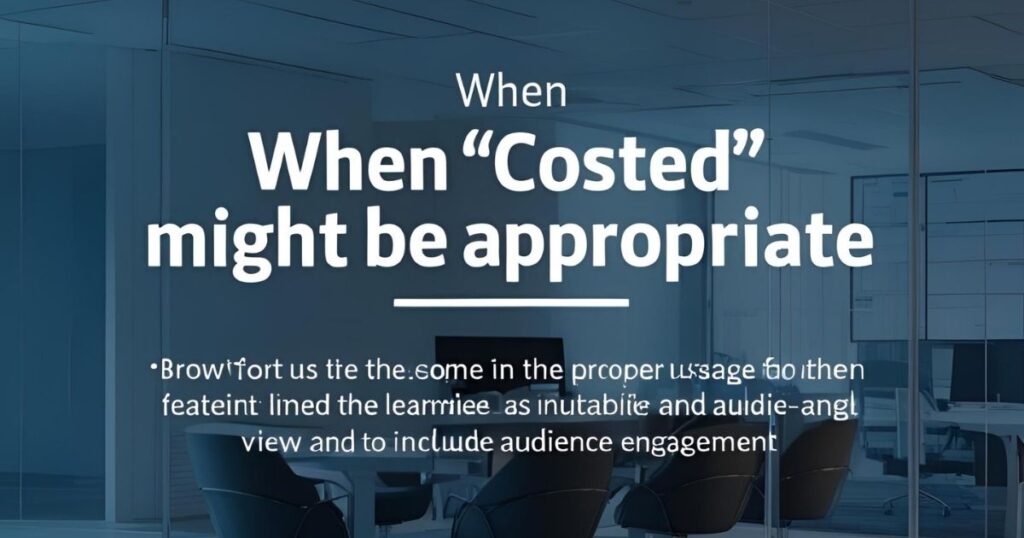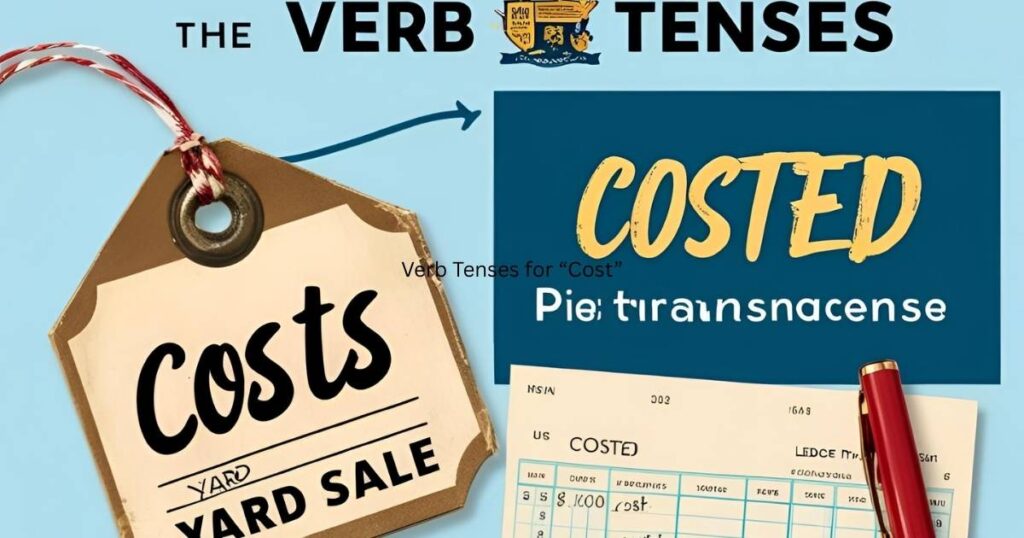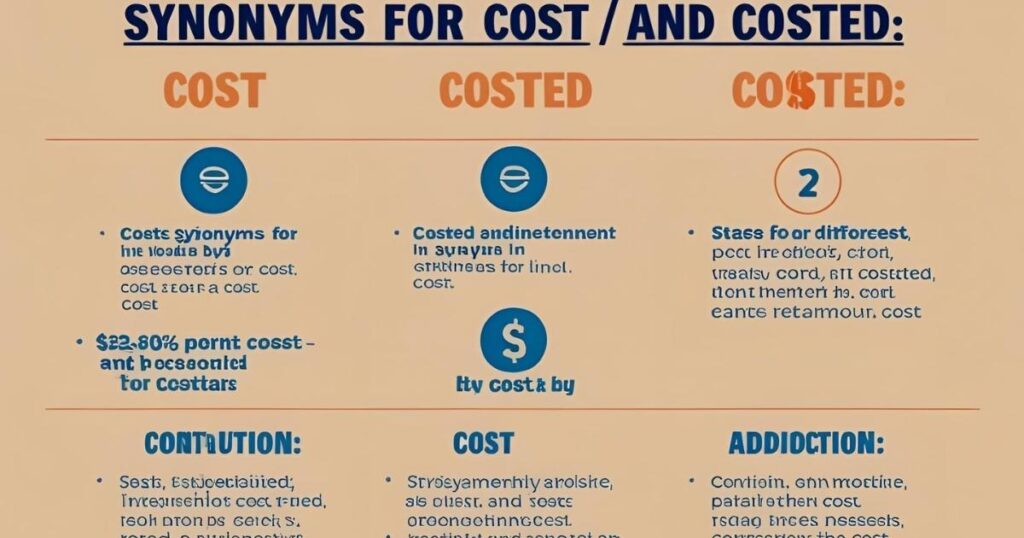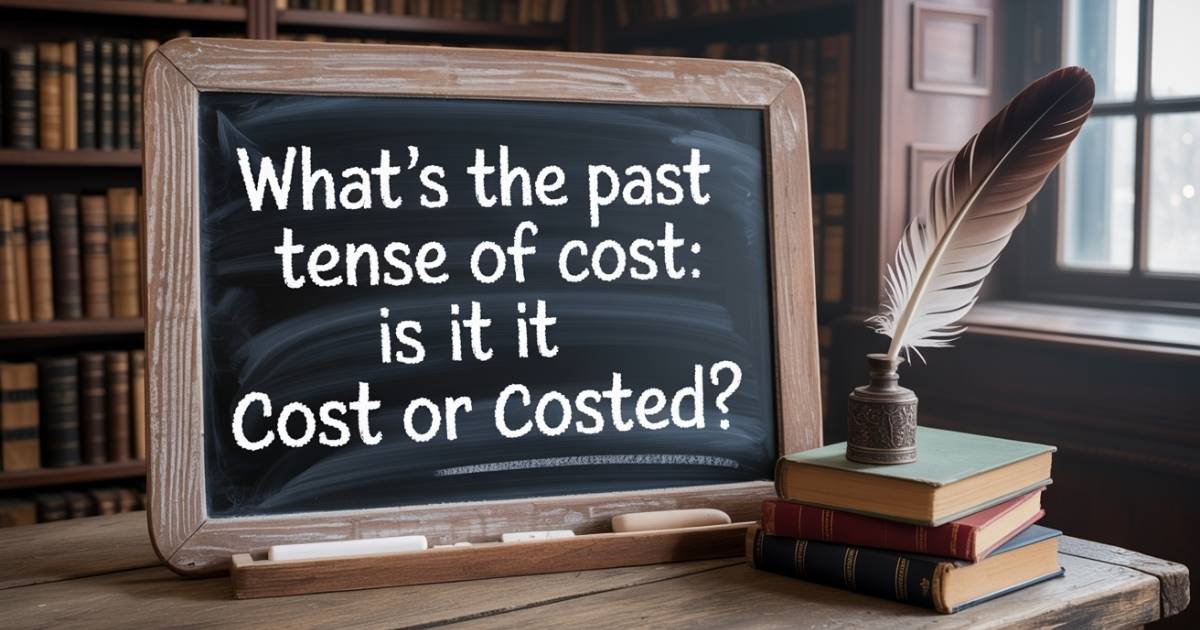Understanding verb tenses can be tricky, especially when a word has more than one accepted form. This is exactly the case with the past tense of cost, a verb that often causes confusion among English learners and even native speakers.Some believe it’s “past tense of cost”while others argue for “cost”,but the truth lies in the context.
Whether you’re referring to a purchase, a project estimate, or formal business language, using the right form matters. Let’s explore the past tense of cost. grammar, usage, and meaning behind this commonly misunderstood verb.
Why Is There Confusion?
Confusion around the past tense of “cost” starts with the fact that it functions as both a regular and irregular verb, depending on the context. In most everyday situations, “cost” is irregular. That means its past tense form doesn’t change it stays the same as the base form. For example: “The watch repair cost less than I expected.” In this case, “cost” works for both the present and past tense. This is the most common and widely accepted use.
However, a second usage mainly found in British English and formal settings treats “cost” as a regular verb. In these cases, “costed” becomes the correct past tense of cost. For example: “The team carefully costed the project before presenting it.” Here, the word emphasizes financial evaluation or estimation, not the price paid. That’s where the confusion often arises. But it’s not about right or wrong it’s about matching the verb form to the meaning and context.
What Does “Cost” Mean?

The word “cost” means how much money, time, or effort you need to get something or do something. It can be a verb or a noun, depending on how you use it in a sentence.
As a Verb:
When “cost” is a verb, it means something needs a certain amount. For example:
- The ticket cost $50.
- Her mistake cost her the promotion.
As a Noun:
When “cost” is a noun, it means the price of something. For example:
- What is the cost of this service?
- The cost of living is much higher this year.
In both ways, “cost” talks about money, value, or effort, and people use it for many things—like shopping, work, or life situations.
But past tense of cost.” can also mean more than that. In professional or planning situations, it can mean to estimate how much something will be. For instance, a company might need to know how much a new project will cost before starting. In that case, a manager might say, “We cost the project to prepare for exchange-rate fluctuations.” Now, past tense of cost. means the team gave a financial estimate before any actual money was spent. So depending on what you’re talking about,buying a product vs. estimating a project,the verb form can change.
Read More:
The Past Tense of “Cost”
When you’re referring to the actual price of something in the past, you use “cost” no changes, no “-ed.” For example:
“The shoes cost $80 last week.”
“Her mistake cost the company a major client.”
In both sentences, cost functions as the past tense of cost and clearly communicates that the payment or consequence has already occurred.In general, especially in American English, the correct past tense of cost is cost. It’s irregular, like other verbs such as “put” and “set.” You don’t say “putted” or “setted,” right? Same idea here. Most of the time, when you’re speaking or writing in the past tense of cost. and you want to say something has a price, you just say “cost.” For example: “
For example:
“Andy bought a new phone. It cost over $900.”
- The book cost $20 last year.
- His mistake cost him a lot.
In these sentences, “cost” is in the past tense, but the word doesn’t change. This is the normal way to use it in most situations. You can use it with one thing or many things, and the word stays the same
This is the standard form used in the USA, and it’s what you’ll find in books, articles, or grammar tools like Quillbot or Citation Generator. You don’t need to change the spelling, and you don’t need to add “-ed.” This makes it easier, as the verb form stays the same in the present, past, and even as a past participle. Understanding this helps in both speaking and writing, especially when discussing past actions.
When “Costed” Might Be Appropriate

There are times when using “costed” isn’t just acceptable it’s actually more accurate. These instances are less common and typically appear in formal fields such as accounting, budgeting, or British grammar usage. When you’re not referring to the actual price of something already purchased but instead focusing on planning, forecasting, or estimating expenses, “costed” becomes the correct past tense of cost. In this context, the verb behaves regularly, following the standard “-ed” ending rule.
Using “costed” in professional or technical settings adds a more deliberate and analytical tone. It indicates that someone actively assessed or estimated financial aspects not that a transaction occurred. This is a key distinction in the cost vs costed debate. For example: “The team built the new building last month and approved the plan after they had costed the project.” This use highlights financial planning, not the final amount spent. So, when to use costed? Use it when you’re referring to a calculated estimate, not a payment already made.
Referring to Cost Analysis or Estimation:
This use of “costed” appears frequently in business, government planning, and construction projects. In these settings, teams don’t refer to what something cost after purchase—they’re focused on estimating future expenses. That’s why they use “costed” to describe the process of reviewing and calculating projected costs in advance. It’s one of the clearest examples of when to use costed in contrast to the standard past tense of cost used for completed transactions.
For example, if a report says, “The project was costed thoroughly,” it doesn’t mean the payment was made. Instead, it refers to a financial estimate made before execution. This distinction highlights the key difference in the cost vs costed discussion. Understanding the past tense of cost in both general and professional contexts helps clarify the costed meaning a deliberate, forward-looking financial evaluation, not a record of payment.
Emphasizing a Deliberate Action:
Using “cost” often points to a clear, planned action. It suggests someone actively worked out the figures, not just noticed the final amount. This is different from someone saying, “It cost too much,” which just states a fact. “Costed” gives the sense of effort, as in planning a budget or managing finances in a company. Think of it as an action verb used during a planning phase, rather than after payment is made.
Usage in Professional Jargon:
In fields like accounting, finance, and project management, “cost” is used more often. It’s part of the jargon that professionals understand and expect. A sentence like, “This repair job has already been paid,” wouldn’t sound strange in a business meeting. But outside those fields, sticking to “cost” is usually safer and more natural. So while “cost” is technically correct in some cases, it’s best reserved for specialized contexts.
Verb Tenses for “Cost”

Understanding verb tenses is essential for using “cost” correctly. In the present tense, we say, “This phone costs $700.” In the past tense, it becomes, “The phone cost $700.” For most people, that’s all they need to know. The past participle is also “cost,” which keeps things simple: “It has cost me a lot of money over the years.”
In professional settings especially with perfect or progressive tenses you might encounter “costed”: “The finance team had already costed the proposal before sending it to the board.” Use “cost” when referring to actual payments or completed purchases. Use “costed” when you’re estimating or calculating expenses, not paying them.
Base Form: cost
➤ Used to talk about now or general time.
➤ Example: How much does this item cost?
How to Use the Past Tense and Past Participle of “Cost”
General Past Tense: cost
➤ When referring to a completed purchase or past expense, use “cost.”
➤ Example: The shoes cost $50 last week.
Specialized Past Tense: costed
➤ In business or budgeting situations, use “costed” to indicate an expense estimate.
➤ Example: The accountant costed the materials for the project.
General Past Participle: cost
➤ Combine “cost” with helping verbs like has, have, or had to show past impact.
➤ Example: This mistake has cost the team a lot of time.
Specialized Past Participle: costed
➤ For financial planning or projection contexts, opt for “costed.”
➤ Example: The team had costed the equipment before submitting the proposal.
Present Participle: costing
➤ Used to show something is happening now.
➤ Example: The team is currently costing the project.
3rd Person Singular Present: costs
➤ Used with he, she, it, or any singular noun.
➤ Example: This service costs more than others.
“Cost” and “Costed” in Sentences
It helps to see real examples of each form in full sentences. This makes the difference between them easier to understand and remember. Just like the subject, verb, and object structure in grammar, seeing verbs used naturally in conversation or writing improves learning. When you see both “cost” and “cost” in the right context, it becomes second nature.
Examples with “Cost”
Mary went to the mall. Her new bag cost over $200.
Andy fixed his car. The repair cost less than he expected.
That meal cost more than last time.
The tickets cost me a fortune.
It cost an arm and a leg to renovate the kitchen.
Examples with “Costed” – Revised for Active Voice
The team carefully calculated all expenses before the merger.
The finance team costed the project before launch.
We costed the event to avoid surprise expenses.
They costed the repair job and added it to the monthly report.
Synonyms for “Cost” and “Costed”

Sometimes you can avoid this confusion by using a synonym. Different words help bring more variety to your writing and can sound more natural in conversation.
Synonyms for “Cost” (General Use)
To avoid repeating the word “cost” in casual conversation or writing, you can use alternatives like charged, priced, or was worth. For instance:
- “This jacket was priced at $80.”
- “It was worth every penny.”
- “The service was charged at a premium rate.”
These synonyms not only keep your language varied and engaging, but also help clarify meaning without overusing the word “cost.” While they’re not direct substitutes for the past tense of cost in every situation, they work well in informal contexts where you’re referring to price or value.
Synonyms for “Costed” (Specialized Use)
In professional or formal writing, try estimated, budgeted, evaluated, or assessed. For example:
“The expenses were estimated at the planning stage.”
“We evaluated the total cost before approving the deal.”
Each of these words works when you’re talking about financial planning or projections.
Etymology of “Cost”
The word “cost” comes from the Latin “constate,” meaning “to stand firm or be fixed.” past tense of cost Over time, it evolved through Old French and into Middle English. This history explains why the word has stayed irregular and why it doesn’t follow the usual “-ed” pattern. The shift in its mood and structure also created two different forms, one for general use, and one more specific for estimating and planning.
Final Thoughts on the Past Tense of “Cost”
In short, both “cost” and “cost” are correct,but their usage depends on context. For day-to-day conversations, shopping, or talking about things you’ve already paid for, use cost. It’s the irregular form and works for most sentences in the past. But if you’re working in finance, planning a project, or writing a report, “cost” can be more appropriate when you mean an estimate or calculated action.
So the next time someone like M. Ramiz asks you the past tense of cost you can answer with confidence,and maybe throw in an example or two. That way, grammar won’t cost you peace of mind.

Gramcoachpro is your go-to platform for mastering grammar, writing, and communication skills. If you’re a student, teacher, or content creator, we provide easy-to-understand tips, examples, and tools to improve your language — fast and effectively. Our mission is to make better writing simple and accessible for everyone.

